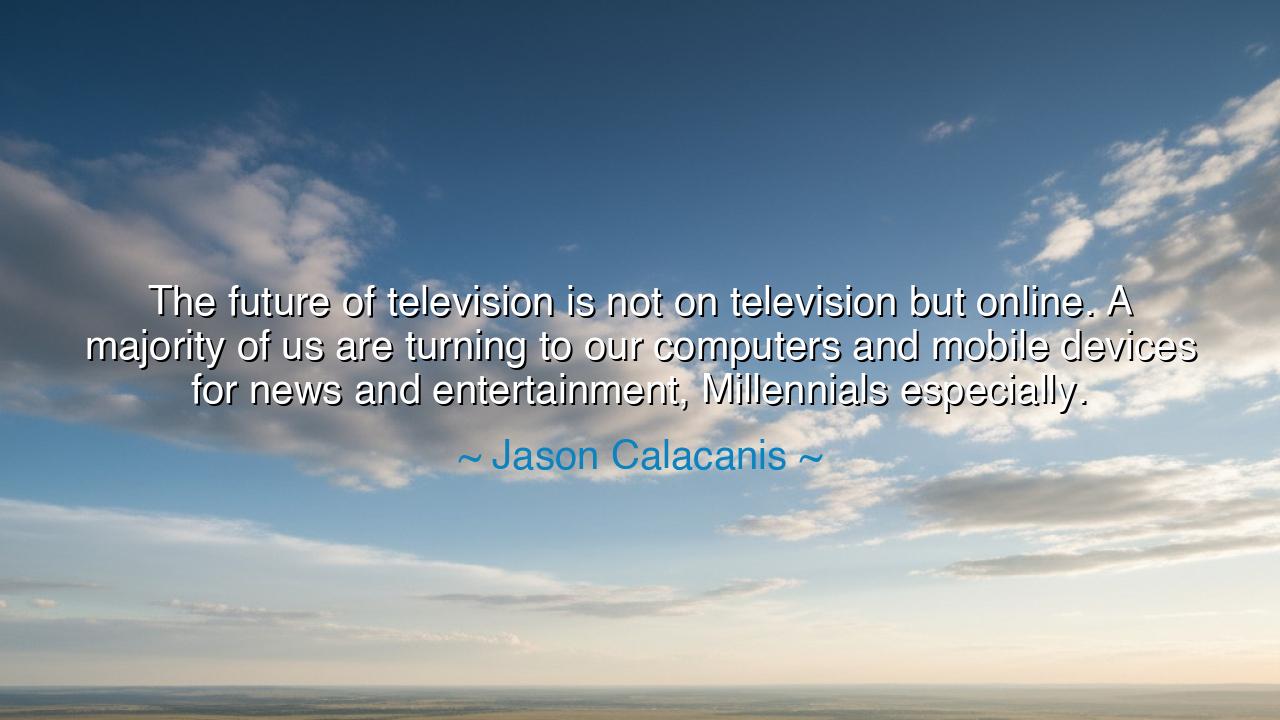
The future of television is not on television but online. A
The future of television is not on television but online. A majority of us are turning to our computers and mobile devices for news and entertainment, Millennials especially.






The modern seer of technology, Jason Calacanis, once spoke with prophetic clarity: “The future of television is not on television but online. A majority of us are turning to our computers and mobile devices for news and entertainment, Millennials especially.” His words ring like a bell in the shifting dawn of a new age—a time when the glowing screen of the television, once the altar of the household, gives way to the light of computers, phones, and networks without walls. This is no mere prediction of markets; it is a reflection on the transformation of human perception itself. The future he speaks of is not only technological—it is cultural, spiritual, and generational.
In the age of our forebears, the television was a sacred fire around which families gathered, as once the ancients gathered around the hearth. It was the storyteller, the entertainer, the silent guest at every evening meal. Through it, nations shared laughter, witnessed history, and dreamed of distant worlds. Yet as the centuries and decades turned, that sacred fire began to flicker—not extinguished, but changed. For humanity, restless and curious, sought not to receive stories passively, but to shape them. Calacanis, in his wisdom, observed this shift—the migration of the mind from the fixed schedules of the old age to the infinite possibility of the online world.
When he says, “The future of television is not on television,” he speaks not in contradiction but in revelation. The screen remains, but the spirit within it has transformed. The stories once broadcast to millions now flow through invisible streams of data, reaching us wherever we are, carried not by airwaves but by the boundless ocean of the Internet. It is as if the great library of Alexandria, burned in flame, was reborn in light—every thought, every voice, every image now accessible to the individual. The power once held by few—the power to create, to broadcast, to shape culture—now belongs to the many. This is the democratization of storytelling, and it is the heartbeat of the modern world.
Consider the story of Netflix, once a humble company that sent DVDs by post, like scrolls from a distant scribe. When others clung to the old ways, Netflix looked forward, seeing that the future of entertainment lay not in physical discs or cable cords, but in the silent, streaming pulse of the Internet. They built their empire not upon the ruins of television, but upon its evolution. And in time, the giants of the old world—networks, studios, broadcasters—had no choice but to follow. This is the pattern of progress throughout all of history: those who cling to what is will be left behind by those who listen to what is becoming.
But Calacanis’s wisdom does not rest solely in technology—it is also a reflection on human desire. He understood that people no longer wish to be mere spectators; they wish to be participants. The old television demanded silence and obedience, but the Internet invites conversation, collaboration, and creation. The Millennials, whom he mentions, are not content to watch—they wish to engage, to share, to shape the narrative itself. They have taken the role of both audience and author, turning the screen from a window into a mirror of the human experience. In this, we see the eternal hunger of the human spirit: to not only receive stories, but to live them.
In ancient times, when the poet Homer sang his tales of heroes, the listeners did not merely hear—they felt, they imagined, they remembered. So too do we now, in this digital era, live within the story. Every post, every video, every stream becomes part of a new mythology, a global chorus of voices. The technology is different, but the yearning is the same: to connect, to understand, to create meaning in the flood of life. Calacanis’s words remind us that while the medium changes, the essence of storytelling—its power to bind humanity together—remains eternal.
The lesson for our generation, then, is clear. We must not fear the transformation of the world’s mediums, nor mourn the passing of old forms. The wise see that progress is not destruction—it is rebirth. Just as the printing press liberated words from the mouths of priests, so the Internet liberates ideas from the gates of broadcasters. But with freedom comes responsibility. Each of us, now a storyteller with our own screen and voice, must wield that power with wisdom and purpose. Let us fill the digital air not with noise, but with truth; not with division, but with imagination; not with vanity, but with vision.
Thus, Jason Calacanis’s words are not merely about the end of television—they are about the rise of human potential. He speaks of an age where the storyteller is everywhere, and the audience is infinite. The hearth has moved from the living room to the palm of the hand, and the flame that once flickered in a box now burns across the world. Let us tend that flame with care. For though the future of television lies online, the future of humanity still lies in its stories—and in the hearts of those wise enough to tell them well.






AAdministratorAdministrator
Welcome, honored guests. Please leave a comment, we will respond soon